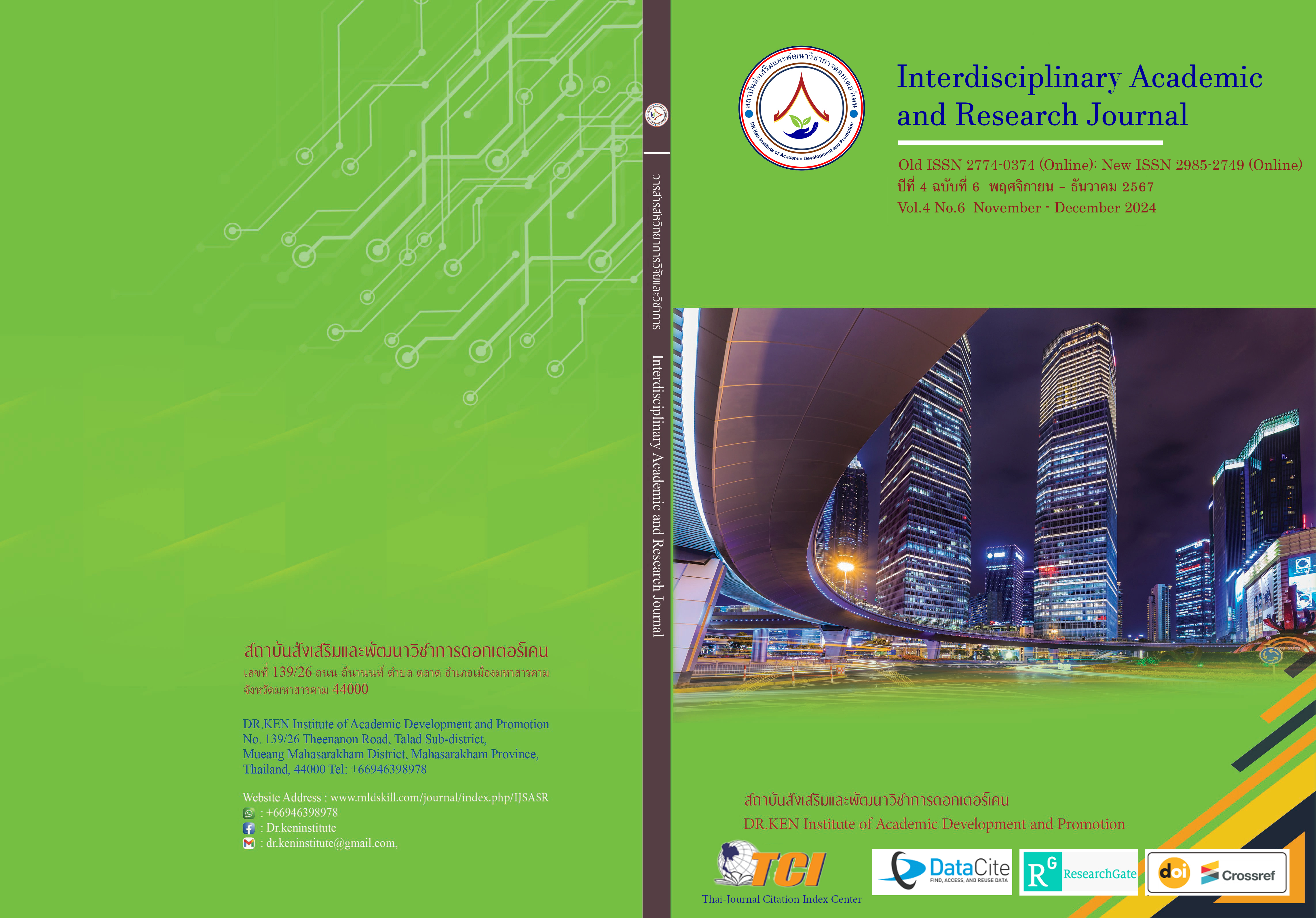Perceived Organizational Support and Self-efficacy that Affect Innovative Work Behavior of Employees of Public Universities in the Three Southern Border Provinces
DOI:
https://doi.org/10.60027/iarj.2024.279096Keywords:
Perceived Organizational Support, Self-Efficacy, Innovative Work Behavior, University EmployeesAbstract
Background and Aims: Innovation is a crucial driving force for organizational development. Universities, as centers for knowledge production and dissemination, must foster innovative behavior among their personnel to develop the organization and achieve strategic goals. This translation captures the key points about the importance of innovation in organizational development, especially in the context of universities as knowledge centers, and the need to promote innovative behavior among staff to achieve strategic objectives. The purposes of this study are (1) to examine the perception of support from organizations that affects the innovative behavior of state university employees in three provinces in the southern border region, and (2) to examine the self-perception that influences the innovative behavior of state university employees in the same three provinces.
Methodology: Data was collected through questionnaires from 404 state university employees, consisting of 160 academic staff and 244 support staff. Data analysis using descriptive statistics and multiple regression analysis to test hypotheses.
Results: The research findings revealed that the perception of support from organizations significantly affects the innovative behavior of state university employees in the southern border region at a statistical level of .05. Additionally, self-perception was found to have a significant influence on the innovative behavior of state university employees in the same region at a statistical level of .05.
Conclusion: This research provides an understanding of the process of perceiving organizational support and self-perception. Furthermore, it can serve as a guideline for developing educational personnel in state universities, fostering sustainable innovative behavior that contributes to a learning organization.
References
เกษสุดา บูรณศักดิ์สถิตย์ และชวนชื่น อัคคะวณิชชา. (2563). พฤติกรรมสร้างสรรค์นวัตกรรมของพนักงานสายสนับสนุนวิชาการมหาวิทยาลัยราชภัฏกลุ่มรัตนโกสินทร์. วารสารศิลปากรมหาวิทยาลัยศิลปากร, 12(6), 138-152. https://he02.tci-haijo.org/index.php/Veridian-E-Journal/article/view/201451
แก้วตา ศรอดิศักดิ์ และชวนชื่น อัคคะวณิชชา. (2561). ปัจจัยเหตุและผลของพฤติกรรมสร้างสรรค์นวัตกรรมของพนักงานธนาคารกรุงเทพเขตจังหวัดนครปฐม. วารสารศิลปากรมหาวิทยาลัยศิลปากร, 11(2), 1531-1545. http://www.mis.ms.su.ac.th/MISMS01/PDF02/545_20190531_j_137.pdf
จิรัชญา ศุขโภคา และวิโรจน์ เจษฎาลักษณ์. (2561). อิทธิพลของการรับรู้การสนับสนุนจากหัวหน้างานและองค์กรที่มีผลต่อประสิทธิภาพในการทำงานผ่านความผูกพันต่อองค์กรและความไว้วางใจของพนักงานกลุ่มอุตสาหกรรมยานยนต์. Veridian E-Journal Silpakorn University, 11(2), 1835-1852. https://he02.tci-thaijo.org/index.php/Veridian-E-Journal/article/view /143272/106026
ณัฎฐิวัชร์ อิทธิไมยยะ. (2564). ปัจจัยที่ส่งผลต่อพฤติกรรมสร้างสรรค์นวัตกรรมของพนักงานบริษัทอสังหาริมทรัพย์ กรณีศึกษา : บริษัทอสังหาริมทรัพย์แห่งหนึ่งในกรุงเทพมหานคร. วิทยานิพนธ์ปริญญามหาบัณฑิต: มหาวิทยาลัยศิลปากร. http://ithesisir.su.ac.th/dspace/bitstream/123456789/3965/1/61602331.pdf
ธัญนันท์ นาคแดง. (2559). ปัจจัยที่มีอิทธิพลต่อความผูกพันทางอาชีพของอาจารย์มหาวิทยาลัยเทคโนโลยีราชมงคล. วิทยานิพนธ์ดุษฎีบัณฑิต มหาวิทยาลัยเกษตรศาสตร์.
ธัญพร ภาคคู. (2565). ปัจจัยที่มีอิทธิพลต่อพฤติกรรมการสร้างสรรค์นวัตกรรมของพนักงาน บริษัทมติชน จำกัด (มหาชน). วิทยานิพนธ์ปริญญามหาบัณฑิต มหาวิทยาลัยศิลปากร. http://ithesis-ir.su.ac.th/dspace/123456789/3670/1/61606314.pdf
บัณฑิต วิเวกวรรณ์ และสมศักดิ์ อมรสิริพงศ์. (2564). การรับรู้การสนับสนุนจากองค์การที่ส่งผลต่อความผูกพันต่อองค์การของบุคลากรเทศบาลในเขตพื้นที่อำเภอเมืองนครปฐม จังหวัดนครปฐม. วารสารการเมืองการปกครอง มหาวิทยาลัยบูรพา, 11(2), 185-202.
ประเวช ชุ่มเกสรกูลกิจ และศจีมาจ ณ วิเชียร. (2561). พฤติกรรมสร้างนวัตกรรมในการทำงาน : แนวคิด ปัจจัยเชิงสาเหตุ ความท้าทาย. วารสารพฤติกรรมศาสตร์เพื่อการพัฒนา มหาวิทยาลัยศรีนครินทรวิโรฒ, 10(1), 25-41. https://so02.tci-thaijo.org/index.php/JBSD/article/view/110682
พัชรกันย์ เมธาอัครเกียรติ และวิโรจน์ เจษฎาลักษณ์. (2561). อิทธิพลของการรับรู้การสนับสนุนจากองค์การ หัวหน้างาน และทีมงานที่มีผลต่อประสิทธิภาพการปฏิบัติงานด้านการสร้างนวัตกรรมระดับบุคคลผ่านสมรรถนะหลักของบุคลากร ในสำนักงานคณะกรรมการการศึกษาขั้นพื้นฐาน. Veridian E-Journal Silpakorn University, 11(2), 886-908. https://he02.tci-thaijo.org/index.php/Veridian-E-Journal/article/view/141367/104769
มนัชยา จันทเขต, มานพ ชูนิล, ปิ่นกนก วงศ์ปิ่นเพ็ชร์. (2564). ปัจจัยเชิงสาเหตุของพฤติกรรมการสร้างนวัตกรรมในการทำงาน ที่มีต่อผลการปฏิบัติงานของบุคลากรสายวิจัยและพัฒนา กระทรวงการอุดมศึกษา วิทยาศาสตร์วิจัยและนวัตกรรม. วารสารสังคมศาสตร์และมานุษยวิทยาเชิงพุทธ, 6(2), 15-30. https://so04.tci-thaijo.org/index.php/JSBA/article/view/255316/173867
มหาวิทยาลัยนราธิวาสราชนครินทร์. (2566). สถิติบุคลากร ม.นราธิวาสราชนครินทร์. กองบริหารทรัพยากรบุคคล. Retrieved from: https://www.pnu.ac.th/human-resources/
มหาวิทยาลัยราชภัฏยะลา. (2566). ข้อมูลบุคลากร. HRM ระบบบุคลากร. Retrieved from: https://hrm.yru.ac.th/main/login?c=Main&a=index
มหาวิทยาลัยสงขลานครินทร์วิทยา เขตปัตตานี. (2565). ข้อมูลสารสนเทศ. กองบริหารทรัพยากรวิทยาเขตปัตตานี. Retrieved from: https://administration.pn.psu.ac.th/web/new2021
รัชชพงษ์ ชัชวาล, คณน ไตรจันทร์ และอิศรัฏฐ์ รินไธสง. (2561). ปัจจัยเชิงสาเหตุที่มีผลต่อพฤติกรรมการสร้างสรรค์นวัตกรรมของพนักงานองค์กรปกครองส่วนท้องถิ่นในภาคใต้ของประเทศไทย. วารสารเทคโนโลยีภาคใต้ วิทยาลัยเทคโนโลยีภาคใต้, 11(1), 113-124. https://so01.tci-thaijo.org/index.php/humanjubru/article/view/250791
ลดาวรรณ หัทยาวัฒน์ และสมโภชน์ เอี่ยมสุภาษิต. (2563). ความสัมพันธ์ระหว่างบุคลิกภาพห้าองค์ประกอบสภาพแวดล้อมในการทำงานและการรับรู้การสนับสนุนจากองค์การ กับพฤติกรรมการสร้างสรรค์นวัตกรรมของพนักงานธนาคารพาณิชย์. วารสารมนุษยศาสตร์และสังคมศาสตร์ วไลยอลงกรณ์ในพระบรมราชูปถัมภ์ มหาวิทยาลัยราชภัฏวไลยอลงกรณ์ ในพระบรมราชูปถัมภ์, 15(2), 99-110. https://digital.library.tu.ac.th/tu_dc/frontend/Info/item/dc:179069
วิกาวี วัฒนวิจารณ์. (2556). ความสัมพันธ์ระหว่างการรับรู้ความสามารถของตนเอง ความคิดสร้างสรรค์ กับพฤติกรรมสร้างนวัตกรรม กรณีศึกษากลุ่มบริษัทผู้ให้บริการด้านการสร้างแบรนด์แบบครบ วงจรแห่งหนึ่ง. การค้นคว้าอิสระปริญญาบริหารธุรกิจมหาบัณฑิต: มหาวิทยาลัยธรรมศาสตร์.
วิลาสินี โสภาพล. (2564). กลไกการสร้างความไว้วางใจของรัฐด้วยนโยบายพหุวัฒนธรรมในสามจังหวัด ชายแดนภาคใต้. กรุงเทพฯ: สถาบันพระปกเกล้า. Retrieved from: https://kpi-lib.com/elib/cgi-bin/opacexe.exe?op=mmvw&db=Main&skin=s&mmid=12436&bid=30219
ศศิมา สุขสว่าง. (2560). การพัฒนาความคิดเชิงนวัตกรรม (Innovative Thinking) เพื่อพัฒนานวัตกรรมในองค์กร. สำนักงานนวัตกรรมแห่งชาติ. Retrieved from: https://www.sasimasuk.com/16828700/
สมพงษ์ เพชรี. (2561). การรับรู้การสนับสนุนจากองค์การที่มีอิทธิพลต่อพฤติกรรมการเป็นสมาชิกที่ดีของ องค์การของพนักงานระดับปฏิบัติการ บริษัท ไทยโอบายาชิ จำกัด. การค้นคว้าอิสระปริญญาบริหารธุรกิจมหาบัณฑิต: มหาวิทยาลัยเทคโนโลยีราชมงคลธัญบุรี.
สุธีรา นิมิตนิวัฒน์. (2562). การรับรู้ความสามารถของตนเองพลังขับเคลื่อนสู่พฤติกรรมสร้างนวัตกรรม. วารสารศิลปศาสตร์ปริทัศน์, 14(2), 136-148.
เหมันต์ พรหมสนธิ์. (2563). อิทธิพลของการรับรู้บรรยากาศทางวิชาการที่มีต่อความผูกพันในการอ่านเชิง วิชาการในวัยรุ่นตอนปลายโดยมีเอกลักษณ์แห่งตน การรับรู้ความสามารถแห่งตน และการให้คุณค่าในการอ่านเป็นตัวแปรส่งผ่าน. ปริญญานิพนธ์ศิลปศาสตรมหาบัณฑิต).มหาวิทยาลัยศรีนครินทรวิโรฒ. http://ir-ithesis.swu.ac.th/dspace/bitstream/123456789/1159/1/gs611130353.pdf
อริสา สำรอง และสมรรถพงศ์ ขจรมณี. (2564). การรับรู้ความสามารถของตนเองความคิดสร้างสรรค์แบบนวัตกรรมที่ส่งผลต่อพฤติกรรมสร้างสรรค์นวัตกรรมในการทำงานของพนักงานมหาวิทยาลัยสายวิชาการมหาวิทยาลัยราชภัฏแห่งหนึ่ง. วารสารเครือข่ายส่งเสริมการวิจัยทางมนุษยศาสตร์และสังคมศาสตร์, 4(3), 1-15. https://so06.tci-thaijo.org/index.php/hsrnj/article/view/253410/171087
AlEssa, H.R. (2023). The Impact of Digital Transformation on Human Resources During the Pandemic COVID-19. Master's thesis, Rochester Institute of Technology. Retrieved from https://repository.rit.edu/theses/11521
Annida, S., & Harsanti, I. (2019). Challenge at Work: Innovative Work Behavior among Teachers. Paper presented at the Third International Conference on Sustainable Innovation 2019–Humanity, 353, 202-205.
Bandura, A. (1986). Social foundations of thought and action: A social cognitive theory. Englewood Cliffs, NJ: Prentice-Hall.
Bandura, A. (2010). Self-Efficacy. In The Corsini Encyclopedia of Psychology. John Wiley & Sons, Inc.
Eisenberger, R., Huntington, R., Hutchison, S., & Sowa, D. (1986). Perceived organizational support. Journal of Applied Psychology, 71(3), 500–507. https://doi.org/10.1037/0021-9010.71.3.500
Ferreira, J., & Azevedo, S. (2007). Entrepreneurial orientation as a main resource and capability on small firm’s growth. Munich Personal RePEc Archive, 5682, 1-20.
Hair, J.F., Black, W.C., Babin, B.J. and Anderson, R.E. (2010). Multivariate Data Analysis. 7th Edition, Pearson, New York.
Hashim, K.L. (2021). Enhancing Innovative Work Behavior of Malaysian Public Sector Employees. Malaysian Journal of Social Sciences and Humanities (MJSSH), 6(2), 253 – 265. DOI: https://doi.org/10.47405/mjssh.v6i2.665
Khan, A., Jan, S., & Anwar, M. (2022). LINKAGES BETWEEN ETHICAL LEADERSHIP, PERCEIVED ORGANIZATIONAL SUPPORT, AND INNOVATIVE WORK BEHAVIORS IN HEIs. Journal of Social Research Development. 3 (2),116-127. 10.53664/JSRD/03-02-2022-01-116-127.
Krejcie, R.V., & D.W. Morgan. (1970). “Determining Sample Size for Research Activities”. Educational and Psychological Measurement. 30(3), 607 – 610.
Little, R.J.A., & Rubin, D.B. (2002). Statistical analysis with missing data. 2nd edition. Hoboken, NJ: John Wiley & Sons.
Nunnally, J.C. (1978). Psychometric theory. 2nd Edition, McGraw-Hill, New York.
Office of the Basic Education Commission. (2018). Basic Education Commission Policy for Fiscal Year 2018. Office of the Basic Education Commission. https://www.obec.go.th/archives/5476
Scott, S.G., & Bruce, R.A. (1994). Determinants of innovation behavior: A path model of individual innovation in the workplace. Academy of Management Journal, 37(3), 581-582.
Wijaya, O.Y.A. (2018). Effect of leader-member exchange and perceived organizational support on innovative work behavior of star-rated hotel employees. Journals Aplikasi Manajemen, 16(4), 574-585.
Downloads
Published
How to Cite
Issue
Section
License
Copyright (c) 2024 Interdisciplinary Academic and Research Journal

This work is licensed under a Creative Commons Attribution-NonCommercial-NoDerivatives 4.0 International License.
Copyright on any article in the Interdisciplinary Academic and Research Journal is retained by the author(s) under the under the Creative Commons Attribution-NonCommercial-NoDerivatives 4.0 International License. Permission to use text, content, images, etc. of publication. Any user to read, download, copy, distribute, print, search, or link to the full texts of articles, crawl them for indexing, pass them as data to software, or use them for any other lawful purpose. But do not use it for commercial use or with the intent to benefit any business.
















.png)


